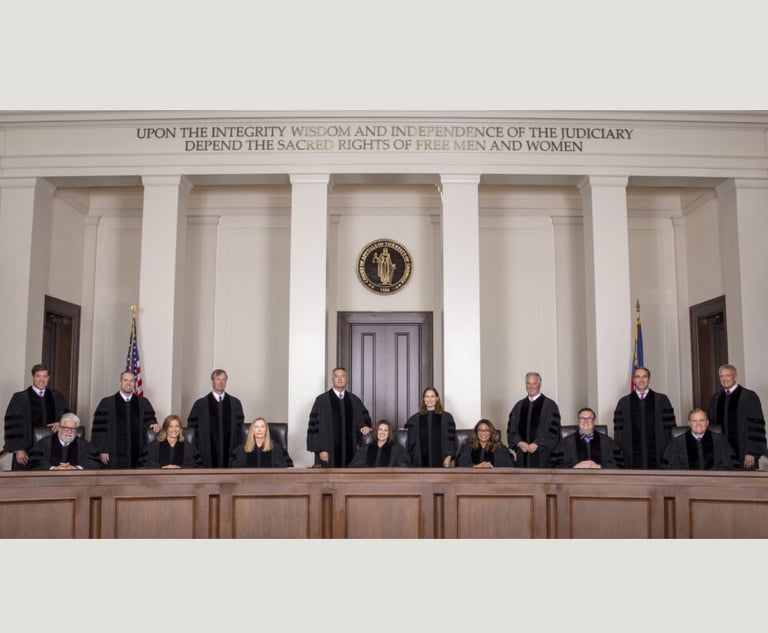 Judge Eleanor Ross, U.S. District Court for the Northern District of Georgia (Courtesy photo)
Judge Eleanor Ross, U.S. District Court for the Northern District of Georgia (Courtesy photo)Judge Sentences Hardwick Co-Conspirator Maurya to Seven Years
“I find this provides sufficient punishment and deterrence—especially deterrence,” the judge said about the sentence of Asha Maurya, the former controller for now-defunct Morris Hardwick Schneider.
February 13, 2019 at 10:03 AM
8 minute read
After sentencing Atlanta lawyer Nathan Hardwick IV to 15 years in prison on Monday for embezzlement, a federal judge the next day sentenced his co-conspirator, Asha Maurya, to seven years followed by three years on supervised release.
That was a sharp increase from the 33 months indicated by the sentencing guidelines.
Judge Eleanor Ross of the U.S. District Court for the Northern District of Georgia said Tuesday it was uncommon for her to sentence above the guidelines, but she did so because of Maurya's “egregious conduct,” the number of people she harmed and her repeated thefts.
“I find this provides sufficient punishment and deterrence—especially deterrence,” the judge said at the sentencing hearing Tuesday.
Maurya was the controller for Hardwick's now-defunct firm, Morris Hardwick Schneider. She helped Hardwick steal millions of dollars from the firm by facilitating wire transfers from its operating and escrow accounts to pay his bills for casinos, private jets, women and other expenses.
Once the largest residential real estate closing firm in the Southeast, Morris Hardwick Schneider filed for bankruptcy less than a year after the discovery in mid-2014 that more than $30 million was missing from its escrow accounts.
The discovery of a bank statement that Maurya admitted to altering brought the escrow account shortfalls to light.
Maurya has been cooperating with the government since she pleaded guilty to one count of conspiracy to commit wire fraud in 2015 and admitted embezzling $900,000 for herself.
Despite Maurya's assistance, the government had asked for 63 months imprisonment, calling her “a career fraudster who embezzled from numerous employers before and after the charged conspiracy.” The charged conspiracy period was from 2011 through mid-2014.
While it was Hardwick who directed Maurya to wire millions of dollars from the firm's accounts to casinos, private jet companies and his personal holding company, Divot, for his benefit, Maurya was as culpable in the destruction of the firm and the damage it caused to its 800 employees and others, said Assistant U.S. Attorney Lynsey Barron on Tuesday.
“If she did not help drive the firm $30 million into the hole and then into bankruptcy, the firm would still be a going concern,” the prosecutor said.
|Maurya Appears
Maurya took full responsibility for her crimes in a statement to the judge. “I betrayed everyone. I outright broke the law,” she said.
“I have no words to diminish the harm and pain I caused to the 800 partners, staff and employees, [owners] Mark and Gerard Wittstadt, Art Morris and [title-insurer] Fidelity,” Maurya said.
Maurya had submitted eight letters to the judge from family, friends, her current employer and a therapist before the hearing, asking for clemency.
Her sister-in-law and the therapist wrote that Maurya had experienced horrific physical and emotional abuse from her father and her brother while growing up, which contributed to her need to keep her employers happy and comply with their demands.
“I understand incarceration. I've been living in a prison since my childhood,” Maurya told the judge.
Ross asked Maurya how many employers she'd stolen from, and Maurya said four.
“I've never seen anything like it,” the judge said, calling the thefts a pattern. “I'm not sure how it relates to the abuse you suffered earlier in life, but I take note of the abuse,” Ross added.
“Ms. Maurya is not beyond redemption,” said her lawyer, Jess Johnson of Pate & Johnson.
|'Shifting Story'
“Ms. Maurya presented an unusual problem,” Barron, the prosecutor, said. The former Morris Hardwick Schneider controller dutifully met with the government each of the 11 times they asked her—but “her story kept shifting,” the prosecutor said.
Maurya was expected to be the government's star witness at Hardwick's three-week trial last fall, but Barron told the judge the prosecutors found out two weeks before it started that she'd “embezzled from every single employer” except her current one.
“So we could not put her on at trial,” Barron said. “But she was critical to help get a handle on the firm's finances.”
Similarly, Barron said, Maurya disclosed neither to Hardwick's co-owners in the law firm, Mark and Gerard Wittstadt, nor to title-insurer Fidelity National Finance, which stepped in and paid $29.5 million to plug the escrow hole, that she'd stolen $900,000 herself. Instead, a former prosecutor on the case, David Chaiken, now a partner at Troutman Sanders, discovered her theft.
At the trial, the judge allowed Hardwick's defense team, led by Ed Garland of Garland, Samuel & Loeb, to call two of Maurya's former employers to testify. That included Tony Thrash, CEO of Pro Care Emergency Services, an ambulance company where she worked after her ouster from Morris Hardwick Schneider.
Thrash alleged in his testimony that Maurya wrongly charged $15,000 on a corporate credit card when she worked as his company's controller in 2014. After three months, he fired her for falsifying financial statements to inflate the company's revenue—and called the FBI.
At that point, Maurya was already cooperating with the FBI in the Hardwick case.
Hardwick's lawyers were unable to convince the jury that Maurya, not Hardwick, was the culprit for the millions embezzled from the firm. The jurors unanimously convicted Hardwick on 21 counts of wire fraud, one count of conspiracy to commit wire fraud and one count of making false statements to banks.
|Shared Culpability
Hardwick's ex-partners in the law firm agreed with the government that Maurya shared culpability with Hardwick. “But for her actions, this catastrophe would not have happened,” said Mark Wittstadt.
Wittstadt said he told Maurya when Hardwick made her the controller of the law firm's closing operation that “her duty was to the firm, not to any one individual,” and if she saw anything amiss, she should come to him or his brother, Gerard Wittstadt.
“She decided instead that, if Nat Hardwick was going to steal, then she was, too,” he said.
In the early days of the crisis, after the escrow shortfalls came to light, Wittstadt said, he and retired partner Art Morris asked Maurya how much money was missing. She told them “two or three million,” he said, when the shortfall was actually more than $30 million.
If they had known the enormity of the shortfall then, in late July 2014, Wittstadt said, they would have gone to Fidelity immediately for help (which they did two weeks later in exchange for Fidelity's eventual ownership of the firm's title company). Instead, they allowed Hardwick to borrow $5 million from his client, golf pro Dusty Johnson, and local businessman Jim Pritchard to replenish the escrow accounts.
Hardwick made Morris Hardwick Schneider the guarantor for the loans without the Wittstadts' permission, they have said, and, after his forced exit in August 2014, the firm refused to pay them.
That prompted well-publicized suits from Johnson and Pritchard that Wittstadt said did him serious and unfounded reputational damage.
Maurya remains free on bond until her restitution hearing, which is set for May 9, the same day as Hardwick's.
Read More:
This content has been archived. It is available through our partners, LexisNexis® and Bloomberg Law.
To view this content, please continue to their sites.
Not a Lexis Subscriber?
Subscribe Now
Not a Bloomberg Law Subscriber?
Subscribe Now
NOT FOR REPRINT
© 2025 ALM Global, LLC, All Rights Reserved. Request academic re-use from www.copyright.com. All other uses, submit a request to [email protected]. For more information visit Asset & Logo Licensing.
You Might Like
View All
Few Atlanta-Centric Law Firms Expected to Pay Associate Bonuses at Market Scale
5 minute read
Experts Not Foreseeing More Rules Governing Prosecutors' Actions After Georgia Court's Removal of DA From Election Case
8 minute read

New Year, New Am Law 100: Challenges Await These Newly Merged Law Firms
7 minute readTrending Stories
- 1'Pull Back the Curtain': Ex-NFL Players Seek Discovery in Lawsuit Over League's Disability Plan
- 2Tensions Run High at Final Hearing Before Manhattan Congestion Pricing Takes Effect
- 3Improper Removal to Fed. Court Leads to $100K Bill for Blue Cross Blue Shield
- 4Michael Halpern, Beloved Key West Attorney, Dies at 72
- 5Burr & Forman, Smith Gambrell & Russell Promote More to Partner This Year
Who Got The Work
Michael G. Bongiorno, Andrew Scott Dulberg and Elizabeth E. Driscoll from Wilmer Cutler Pickering Hale and Dorr have stepped in to represent Symbotic Inc., an A.I.-enabled technology platform that focuses on increasing supply chain efficiency, and other defendants in a pending shareholder derivative lawsuit. The case, filed Oct. 2 in Massachusetts District Court by the Brown Law Firm on behalf of Stephen Austen, accuses certain officers and directors of misleading investors in regard to Symbotic's potential for margin growth by failing to disclose that the company was not equipped to timely deploy its systems or manage expenses through project delays. The case, assigned to U.S. District Judge Nathaniel M. Gorton, is 1:24-cv-12522, Austen v. Cohen et al.
Who Got The Work
Edmund Polubinski and Marie Killmond of Davis Polk & Wardwell have entered appearances for data platform software development company MongoDB and other defendants in a pending shareholder derivative lawsuit. The action, filed Oct. 7 in New York Southern District Court by the Brown Law Firm, accuses the company's directors and/or officers of falsely expressing confidence in the company’s restructuring of its sales incentive plan and downplaying the severity of decreases in its upfront commitments. The case is 1:24-cv-07594, Roy v. Ittycheria et al.
Who Got The Work
Amy O. Bruchs and Kurt F. Ellison of Michael Best & Friedrich have entered appearances for Epic Systems Corp. in a pending employment discrimination lawsuit. The suit was filed Sept. 7 in Wisconsin Western District Court by Levine Eisberner LLC and Siri & Glimstad on behalf of a project manager who claims that he was wrongfully terminated after applying for a religious exemption to the defendant's COVID-19 vaccine mandate. The case, assigned to U.S. Magistrate Judge Anita Marie Boor, is 3:24-cv-00630, Secker, Nathan v. Epic Systems Corporation.
Who Got The Work
David X. Sullivan, Thomas J. Finn and Gregory A. Hall from McCarter & English have entered appearances for Sunrun Installation Services in a pending civil rights lawsuit. The complaint was filed Sept. 4 in Connecticut District Court by attorney Robert M. Berke on behalf of former employee George Edward Steins, who was arrested and charged with employing an unregistered home improvement salesperson. The complaint alleges that had Sunrun informed the Connecticut Department of Consumer Protection that the plaintiff's employment had ended in 2017 and that he no longer held Sunrun's home improvement contractor license, he would not have been hit with charges, which were dismissed in May 2024. The case, assigned to U.S. District Judge Jeffrey A. Meyer, is 3:24-cv-01423, Steins v. Sunrun, Inc. et al.
Who Got The Work
Greenberg Traurig shareholder Joshua L. Raskin has entered an appearance for boohoo.com UK Ltd. in a pending patent infringement lawsuit. The suit, filed Sept. 3 in Texas Eastern District Court by Rozier Hardt McDonough on behalf of Alto Dynamics, asserts five patents related to an online shopping platform. The case, assigned to U.S. District Judge Rodney Gilstrap, is 2:24-cv-00719, Alto Dynamics, LLC v. boohoo.com UK Limited.
Featured Firms
Law Offices of Gary Martin Hays & Associates, P.C.
(470) 294-1674
Law Offices of Mark E. Salomone
(857) 444-6468
Smith & Hassler
(713) 739-1250






